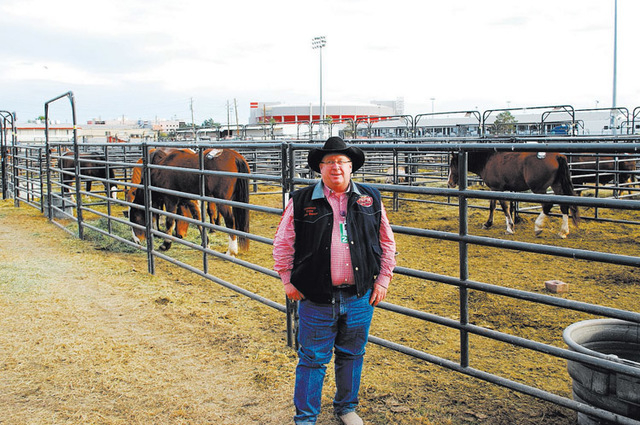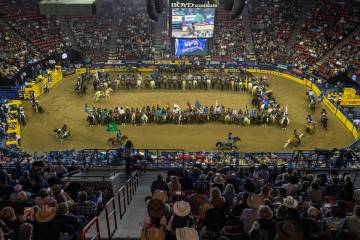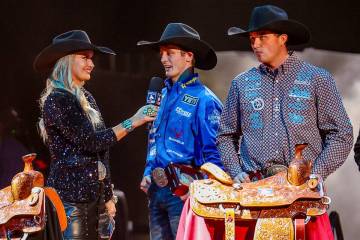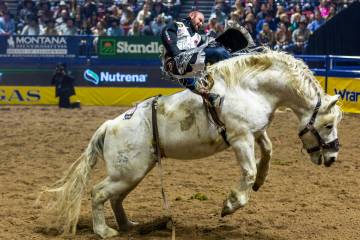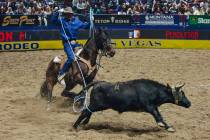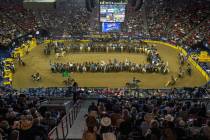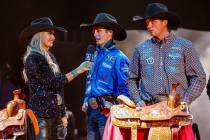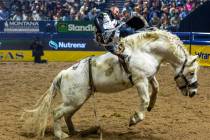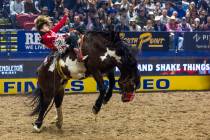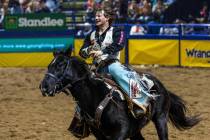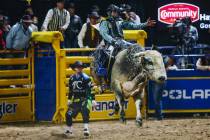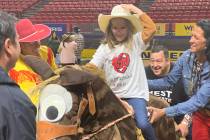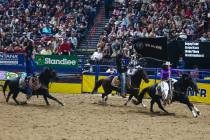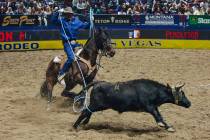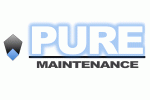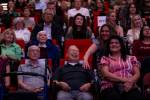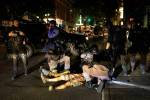Health of animals chief concern for rodeo world
Contestants at the Wrangler National Finals Rodeo get all of the glory, but there are hundreds of other “athletes” that deserve some credit as well.
The animals that are part of the Wrangler NFR — from the bucking stock and the steer wrestling, tie-down roping, team roping and barrel racing horses, to the steer wrestling and team roping steers and tie-down roping calves — help make the rodeo the best of its kind. If they don’t perform well, the event suffers, and if they suffer, it hurts the sport even more.
But rodeo animals rarely, if ever, suffer or deal with hardships, and everyone involved in the rodeo industry is dedicated to making sure their welfare is a top priority. The animal athletes are some of the best cared-for four-legged creatures on the planet, and the sport of ProRodeo and its constituents are to thank for that.
The top-notch care animals receive should come as no surprise in a sport and industry filled with animal lovers.
“I’ve been a professional cowboy since 1980, and I’ve never witnessed any animal abuse,” ProRodeo Hall of Fame team roper Jake Barnes said. “We’ve got thousands and thousands of dollars invested in our animals, and to go abuse them makes no sense whatsoever. They’re about 80 percent about how we make our living, so the better they feel and the better we take care of them, the better they’re going to perform for us.
“I love my animals, and you get attached to them.”
The Professional Rodeo Cowboys Association has worked diligently to improve and increase the amount of animal welfare information that is distributed throughout the industry and also to others outside the rodeo world in an effort to educate the masses about the high level of care that is possible for rodeo animals. Two of the people who are tasked with that endeavor are PRCA Director of Industry Outreach Cindy Schonholtz and ProRodeo Hall of Fame veterinarian Dr. Doug Corey.
Schonholtz and Corey are proud of the association’s leadership role in spreading the benefits of animal welfare and the sport’s commitment to the care of its animals.
“The program in place within the PRCA is always changing and always expanding,” Schonholtz said. “We work all year to help all of our 600 rodeos, and we’ve built quite a program through the years. The committees really understand the importance of the livestock and that, without healthy animals, you just don’t have a good show.”
Animal welfare is about more than just having a good show, though, and those in the rodeo business know it fully.
“It’s all for the health of the livestock,” Schonholtz said. “It’s not about what will look better, but actually what’s better for the livestock. You can put out all of the press releases and information in the world, but if fans don’t go to our rodeos and see healthy animals, they’re not going to believe it.”
Timed-event contestants are famous for pampering their horses, with the four-legged beauties receiving everything from mud and ice packs on a routine basis and specialized feed to hydrotherapy in pools, equine massage and chiropractic services.
Some contestants spend a great deal of time and money caring for their horses, and many bring their own veterinarians to Las Vegas.
“When they come here, the last thing they want is a horse that’s injured or sick,” Corey said. “So, they do take extremely good care of them.”
All Wrangler NFR animals receive quality care during the regular season and while they’re in Las Vegas for the Finals. PRCA Board of Directors member John Barnes leads a crew of 11 that is tasked with caring for more than 520 animals at the Wrangler NFR stock pens that span more than five acres immediately northwest of the Thomas &Mack Center.
This is Barnes’ fourth consecutive year as Wrangler NFR livestock superintendent, and he also served as assistant superintendent for five years beforehand. A longtime PRCA stock contractor who grew up in a rodeo family that included his ProRodeo Hall of Fame father, Bob, Barnes cherishes his role as superintendent.
“I’ve been raised up in the rodeo business, so livestock has always been my livelihood,” he said. “I never once thought I’d be lucky enough to be the livestock superintendent. I don’t take the responsibility lightly.”
Barnes, Assistant Livestock Superintendent Ryan Brown and their staff work long hours feeding, caring for and moving the Wrangler NFR’s stock on a daily basis. Every animal is fed twice a day, taken to an exercise pen once daily and kept hydrated with fresh water.
The animals are sorted and kept in pens with other animals from their stock contracting company, and Barnes and the PRCA stock contractors who have animals selected for the Finals make sure the bulls are separated correctly to avoid fights or disagreements that could result in injury. Barnes and the other contractors also team together to make sure each bucker is fed a specific diet that suits them best, and that important touch helps the animal athlete perform at top form.
“What people don’t understand a lot of times is that the animals of rodeo are like the motor of a race car in NASCAR,” Barnes said. “If the motor isn’t good, I don’t care how nice or fancy it looks, it’s not going to happen.”
The animals are kept safe by 24-hour security on the property, and Barnes and his crew have someone on the grounds at all times to watch them.
“We have eyes on them at all times, because you never know when an animal might show up to be sore-footed or injured from the night before,” Barnes said. “We all try to work in unison.”
Each day, the Wrangler NFR judges evaluate the stock that will perform in each night’s performance, and if there is an animal with a health issue, they are pulled from the lineup. In addition, the Wrangler NFR provides a team of veterinarians led by Dr. Garth Lamb that evaluates and cares for any animals that may need treatment.
The animals’ health is more important than making sure they appear in the $6.375 million rodeo.
“They’re not taken for granted, and the animals at this rodeo are not expendable,” Barnes said. “They are the top of the mountain, in our opinion.
“Once an animal gets here, everyone wants them to be used (in the performances) and shown off and show the quality of animals within their company, but it’s our job to make sure we take the blinders off and put the welfare of the animal first. We want to make sure there’s no long-term detriment to the animal, and if there’s any question, they need to get taken care of and get healthy so they can come back the next year.”
Five years ago, Barnes added a tent to the grounds to provide cover for the rodeo’s tie-down roping calves, which are a bit more fragile and susceptible to the elements than their bigger and tougher steer cousins.
Team roping steers are fitted with horn wraps that protect their horns from the headers’ ropes, and they wear those throughout the 10-day rodeo. Because of the people and safeguards, the Wrangler NFR sets the standard for animal welfare in the industry, and the PRCA’s more than 600 rodeo committees take notes for ways to improve their own rodeos back home.
Dr. Corey has been impressed by the evolution of animal welfare in the sport and at the Wrangler NFR during his 33 years working with the PRCA. He lauded Barnes and his staff’s dedication to the animals.
“They’re really proud of what they do and how they take care of these animals, and they do a very good job,” Corey said. “It’s really important.”
Neal Reid is a Colorado Springs, Colo.-based freelance writer who spent five years as editor of the ProRodeo Sports News. He has written for Western Horseman, American Cowboy, The Ketchpen, Persimmon Hill, USA Today, Newsday, MLB.com, ESPN.com, ESPNW.com, the Colorado Springs Gazette and Denver Post, among others. Reid, a member of the Rodeo Historical Society, covered the 2014 Olympic Winter Games and Paralympic Winter Games in Sochi, Russia, for the Olympic and Paralympic News Service and is a veteran of 10 Wrangler NFRs. Follow him on Twitter @NealReid21.



